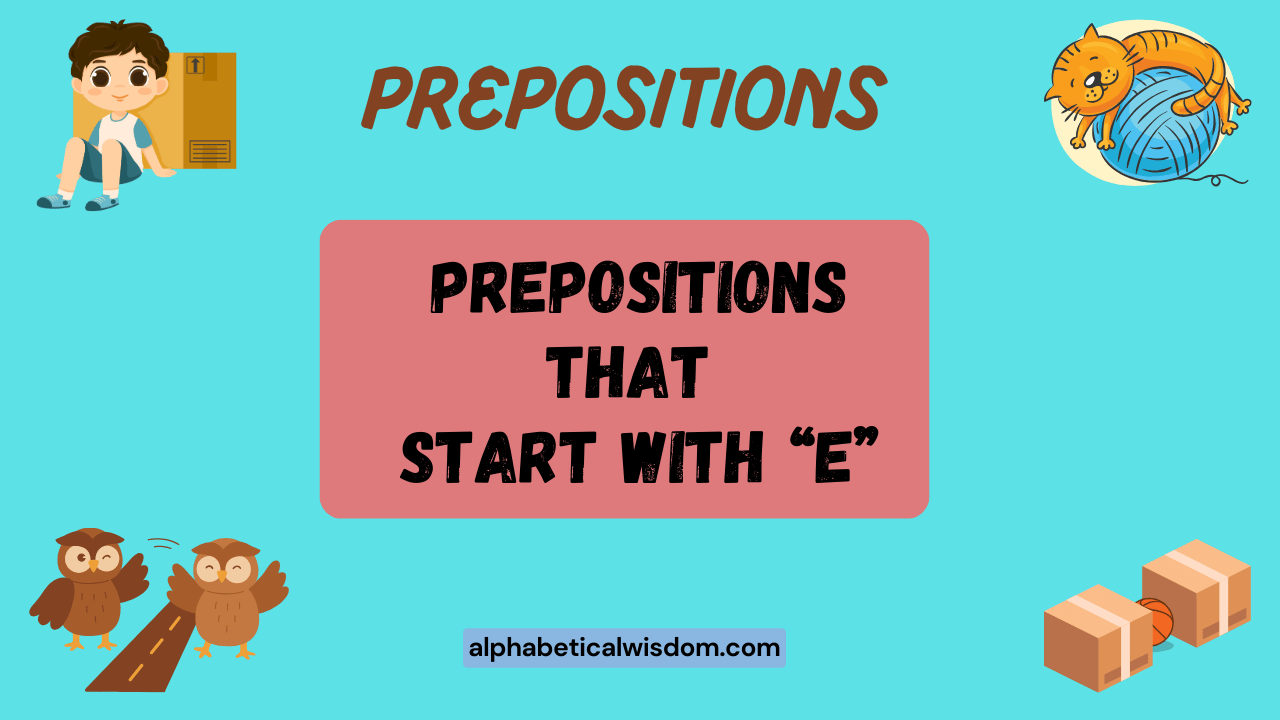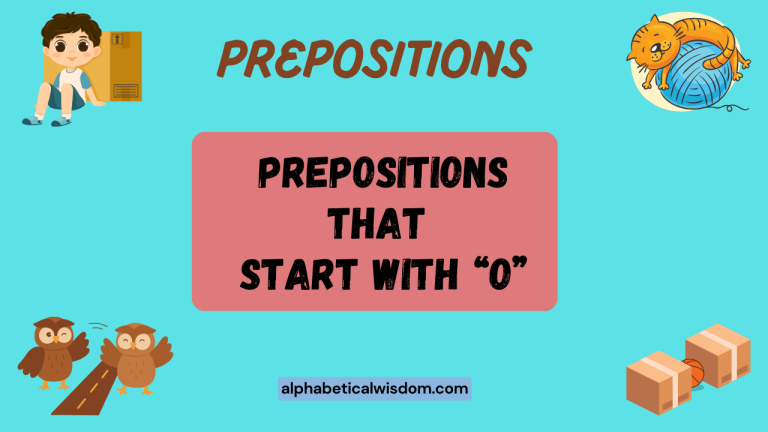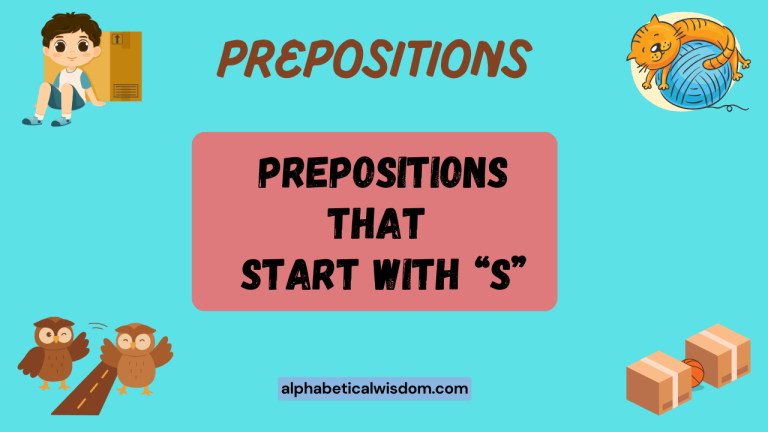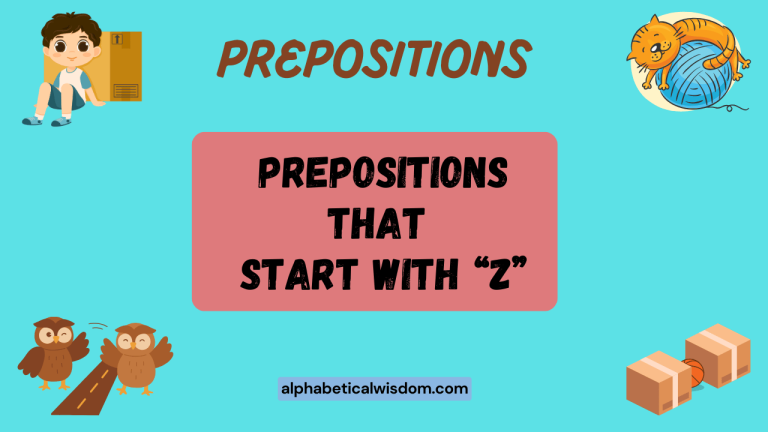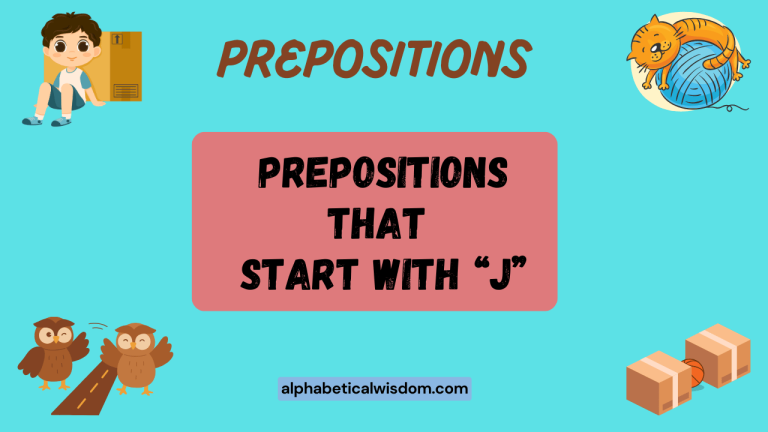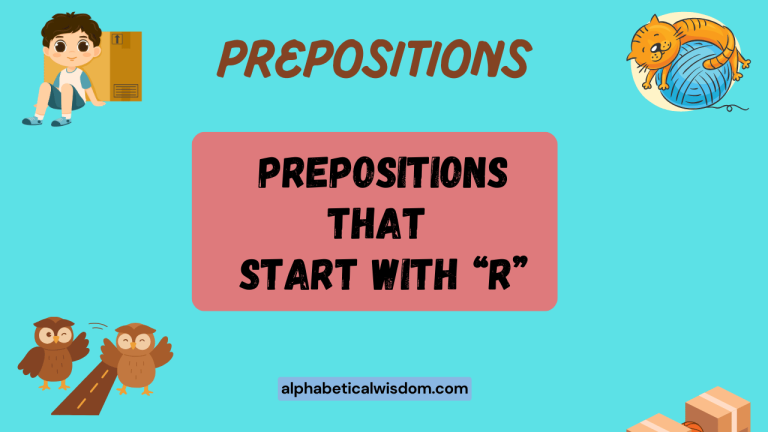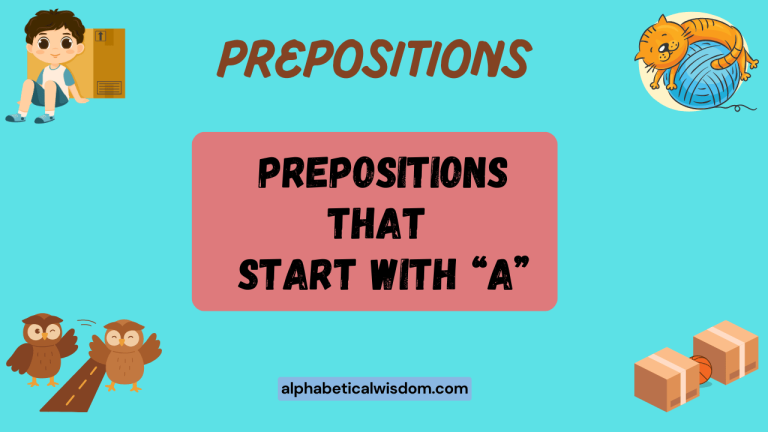Prepositions Starting with E: A Comprehensive Grammar Guide
Mastering prepositions is crucial for constructing clear and grammatically correct sentences in English. While many prepositions are commonly used and easily recognized, those starting with the letter ‘E’ can sometimes be overlooked or misused.
This article provides a comprehensive guide to prepositions that begin with ‘E,’ explaining their meanings, usage, and providing numerous examples to enhance your understanding and proficiency. Whether you’re an English language learner or simply seeking to refine your grammar skills, this guide will equip you with the knowledge to use these prepositions confidently and accurately.
Table of Contents
- Introduction
- Definition of Prepositions
- Structural Breakdown of Prepositions
- Types of Prepositions Starting with E
- Examples of Prepositions Starting with E
- Usage Rules for Prepositions Starting with E
- Common Mistakes with Prepositions Starting with E
- Practice Exercises
- Advanced Topics: Nuances and Complex Usage
- Frequently Asked Questions (FAQ)
- Conclusion
Introduction
Prepositions are essential components of English grammar, acting as bridges that connect nouns, pronouns, and phrases to other parts of a sentence. They indicate relationships such as location, direction, time, and manner.
While many prepositions are familiar, those beginning with the letter ‘E’ can present specific challenges. Understanding how to use prepositions like ‘except’ and phrases like ‘entrusted to’ correctly is vital for clear and effective communication.
This guide aims to demystify these prepositions, providing a structured approach to learning their meanings, usage rules, and common pitfalls. This will be beneficial for English language learners, students preparing for exams, and anyone who wants to improve their grammar skills.
Definition of Prepositions
A preposition is a word that connects a noun, pronoun, or noun phrase to other words in a sentence. It typically indicates the spatial, temporal, or logical relationship of the object to the rest of the sentence. Prepositions usually come before the noun or pronoun, which is called the object of the preposition.
Prepositions are classified based on their form and function. Simple prepositions consist of a single word (e.g., in, on, at). Compound prepositions are formed by combining two or more words (e.g., according to, in spite of). Prepositional phrases include the preposition and its object, along with any modifiers (e.g., in the morning, on the table).
The primary function of a preposition is to establish a relationship between the noun or pronoun it governs and another element in the sentence. This relationship can denote location (The book is on the table), time (I will see you in the morning), direction (He walked to the store), or other abstract connections (She is interested in music).
Structural Breakdown of Prepositions
Understanding the structure of prepositional phrases is crucial for mastering their usage. A prepositional phrase consists of a preposition followed by its object, which is typically a noun or pronoun. The object may be modified by adjectives or other descriptive words.
The basic structure is: Preposition + (Optional Modifiers) + Object. For example, in the phrase “in the big box,” ‘in’ is the preposition, ‘the big’ are the modifiers, and ‘box’ is the object. The entire phrase functions as a unit, often acting as an adjective (modifying a noun) or an adverb (modifying a verb, adjective, or another adverb).
Prepositional phrases can be embedded within other phrases, creating complex sentence structures. For example, “The book on the top shelf in the library is overdue.” Here, “on the top shelf” and “in the library” are both prepositional phrases modifying ‘book’ and ‘shelf’, respectively.
Types of Prepositions Starting with E
While there aren’t many single-word prepositions starting with ‘E’, the most common one is ‘except’. Additionally, prepositional phrases beginning with ‘E’ are frequently used.
These phrases function as single prepositional units, conveying specific meanings.
Except
The preposition ‘except‘ indicates exclusion. It means “not including” or “excluding.” It’s used to specify what or whom is not included in a general statement.
Entrusted To
The prepositional phrase ‘entrusted to‘ indicates that someone or something has been given to someone else for safekeeping or management. It implies a sense of responsibility and trust.
Examples of Prepositions Starting with E
To illustrate the usage of prepositions starting with ‘E’, let’s examine specific examples in different contexts. These examples will help clarify their meanings and how they function within sentences.
Entrusted To
The phrase “entrusted to” signifies a transfer of responsibility or care. It’s often used when someone is given a task or an object to look after.
Here are some examples of how “entrusted to” is used in sentences:
| Sentence | Explanation |
|---|---|
| The company’s finances were entrusted to a new accounting firm. | The responsibility of managing the company’s finances was given to the accounting firm. |
| The secret was entrusted to her best friend. | She shared the secret with her best friend, trusting them to keep it safe. |
| The package was entrusted to the delivery service for transport. | The delivery service was given the package to transport it. |
| His children were entrusted to the care of their grandparents while he was away. | The grandparents were responsible for the children while he was away. |
| The museum’s rare artifacts are entrusted to the conservation team. | The conservation team is responsible for protecting and preserving the artifacts. |
| The success of the project was entrusted to the project manager. | The project manager was given the responsibility for ensuring the project’s success. |
| My dog was entrusted to the dog sitter while I went on vacation. | The dog sitter was responsible for taking care of the dog while I was on vacation. |
| The sensitive information was entrusted to a secure server. | The secure server was responsible for protecting the sensitive information. |
| The ancient manuscript was entrusted to the library’s archivist. | The archivist was responsible for preserving the ancient manuscript. |
| Her reputation was entrusted to her public relations team. | The public relations team was responsible for maintaining her good reputation. |
| The safety of the passengers was entrusted to the pilot. | The pilot was responsible for ensuring the safety of the passengers. |
| The future of the company was entrusted to the new CEO. | The new CEO was responsible for leading the company into the future. |
| The care of the elderly was entrusted to the nursing home staff. | The nursing home staff was responsible for taking care of the elderly residents. |
| The design of the building was entrusted to the architectural firm. | The architectural firm was responsible for designing the building. |
| The training of the new recruits was entrusted to the experienced officers. | The experienced officers were responsible for training the new recruits. |
| The development of the software was entrusted to the software engineers. | The software engineers were responsible for developing the software. |
| The organization of the event was entrusted to the event planner. | The event planner was responsible for organizing the event. |
| The maintenance of the equipment was entrusted to the maintenance crew. | The maintenance crew was responsible for maintaining the equipment. |
| The distribution of the funds was entrusted to the finance department. | The finance department was responsible for distributing the funds. |
| The coordination of the project was entrusted to the project coordinator. | The project coordinator was responsible for coordinating the project. |
| The management of the property was entrusted to the property manager. | The property manager was responsible for managing the property. |
| The supervision of the workers was entrusted to the foreman. | The foreman was responsible for supervising the workers. |
| The guidance of the students was entrusted to the teacher. | The teacher was responsible for guiding the students. |
Except
The preposition “except” is used to exclude something or someone from a general statement. It indicates an exception to a rule or a condition.
Here are some examples of how “except” is used in sentences:
| Sentence | Explanation |
|---|---|
| Everyone except John attended the meeting. | John did not attend the meeting; everyone else did. |
| I like all fruits except durian. | I enjoy eating fruits, but I don’t like durian. |
| The store is open every day except Sunday. | The store is closed on Sunday but open on all other days. |
| All the students passed the exam except for one. | Only one student failed the exam; the rest passed. |
| I’ve visited every country in Europe except Russia. | I have not yet visited Russia, but I’ve been to all other European countries. |
| She eats everything except spicy food. | She avoids spicy food but eats everything else. |
| The entire team completed the project except for a few minor tasks. | The project is almost entirely complete; only a few minor tasks remain. |
| He answered all the questions correctly except the last one. | He missed only the last question on the test. |
| The concert was enjoyable for everyone except those who dislike loud music. | People who dislike loud music did not enjoy the concert. |
| All the flowers are in bloom except the roses. | The roses have not yet bloomed, but all other flowers have. |
| The museum is free to enter for everyone except tourists. | Tourists have to pay to enter the museum, but it’s free for everyone else. |
| I have read all the books in the series except the latest one. | I have not yet read the latest book in the series, but I’ve read all the others. |
| The restaurant serves all types of cuisine except Indian. | You can find many different cuisines at the restaurant, but not Indian food. |
| Every piece of furniture was on sale except the antique desk. | The antique desk was not discounted, but all other furniture was. |
| All the employees received a bonus except those on probation. | Employees on probation did not receive a bonus. |
| The park is open to the public every day except during special events. | The park is closed to the public during special events. |
| I enjoy all kinds of music except heavy metal. | I don’t enjoy heavy metal music, but I like all other genres. |
| The entire collection was donated to the museum except for a few personal items. | A few personal items were kept back, but the rest of the collection was donated. |
| Every student participated in the activity except Mary, who was absent. | Mary was absent and did not participate in the activity. |
| All the rooms in the hotel have a view except the ones on the ground floor. | The ground floor rooms do not have a view. |
| I tried every dish on the menu except the seafood platter, due to my allergy. | I didn’t try the seafood platter because I am allergic. |
| The new software is compatible with all operating systems except older versions of Windows. | The software may not work on older versions of Windows. |
| All the team members completed their tasks on time except for Tom. | Tom did not finish his tasks on time. |
Usage Rules for Prepositions Starting with E
To use prepositions starting with ‘E’ correctly, it’s important to understand the specific rules that govern their usage. This section outlines these rules and provides guidelines for avoiding common errors.
Rules for ‘Except’
- Placement: ‘Except’ typically comes before the noun or pronoun it excludes.
- Function: It introduces an exception to a general statement.
- Alternatives: ‘Except for’ and ‘with the exception of’ can often be used interchangeably with ‘except,’ but ‘except’ is generally more concise.
- Clarity: Ensure that the sentence clearly indicates what is being excluded.
Rules for ‘Entrusted To’
- Meaning: ‘Entrusted to’ implies a transfer of responsibility or care.
- Context: It’s used when someone or something is given to another for safekeeping or management.
- Usage: It often follows a verb like ‘was’ or ‘were’ to indicate who or what is responsible.
- Formality: This phrase is generally more formal and suggests a high level of trust.
Common Mistakes with Prepositions Starting with E
Even experienced English speakers sometimes make mistakes with prepositions. Identifying these common errors can help you avoid them in your own writing and speech.
| Incorrect | Correct | Explanation |
|---|---|---|
| Everyone was invited, accept John. | Everyone was invited, except John. | ‘Accept’ (a verb) means to receive or agree, while ‘except’ (a preposition) means excluding. |
| The documents were entrusted with her. | The documents were entrusted to her. | The correct phrase is ‘entrusted to,’ indicating responsibility or care given to someone. |
| I like all the movies expect this one. | I like all the movies except this one. | ‘Expect’ (a verb) means to anticipate, while ‘except’ (a preposition) means excluding. |
| The secret was entrusted in him. | The secret was entrusted to him. | The correct phrase is ‘entrusted to,’ indicating a transfer of trust. |
| All the books were returned, exited one. | All the books were returned, except one. | ‘Exited’ (a verb) means to leave, while ‘except’ (a preposition) means excluding. |
Practice Exercises
Test your understanding of prepositions starting with ‘E’ with these practice exercises. Fill in the blanks with the correct preposition or prepositional phrase.
Exercise 1: Using “Except”
Complete the following sentences with the correct use of “except.”
| Question | Answer |
|---|---|
| 1. I enjoy all types of music _______ classical. | except |
| 2. Everyone _______ Tom knew the answer. | except |
| 3. The store is open daily _______ Sundays. | except |
| 4. I’ve traveled to every continent _______ Antarctica. | except |
| 5. All the students passed the test _______ one. | except |
| 6. She eats everything _______ seafood. | except |
| 7. The entire team completed the project _______ for the final report. | except |
| 8. He answered all the questions _______ the last one. | except |
| 9. The museum is free for everyone _______ tourists. | except |
| 10. I’ve read all the books _______ the latest release. | except |
Exercise 2: Using “Entrusted To”
Complete the following sentences with the correct use of “entrusted to.”
| Question | Answer |
|---|---|
| 1. The care of the children was _______ their grandparents. | entrusted to |
| 2. The company’s secrets were _______ the CEO. | entrusted to |
| 3. The ancient artifacts were _______ the museum curator. | entrusted to |
| 4. The safety of the passengers was _______ the pilot. | entrusted to |
| 5. The organization of the event was _______ the event planner. | entrusted to |
| 6. The management of the property was _______ the property manager. | entrusted to |
| 7. The distribution of the funds was _______ the finance department. | entrusted to |
| 8. My pet was _______ the pet sitter. | entrusted to |
| 9. The success of the mission was _______ the team leader. | entrusted to |
| 10. The responsibility of the project was _______ the project manager. | entrusted to |
Advanced Topics: Nuances and Complex Usage
For advanced learners, understanding the nuances and complex usage of prepositions starting with ‘E’ can enhance their proficiency. This involves recognizing subtle differences in meaning and usage across various contexts.
Nuances of “Except”
While ‘except’ generally indicates exclusion, the degree of exclusion can vary. Sometimes, it implies a minor exception that doesn’t significantly alter the overall statement.
In other cases, the exception can be more substantial, significantly changing the meaning.
Consider these examples:
- “The cake is delicious except for a slight aftertaste.” (Minor exception)
- “The entire plan worked perfectly, except for the final step.” (Significant exception)
Complex Usage of “Entrusted To”
The phrase ‘entrusted to’ can imply a legal or formal transfer of responsibility, or it can simply indicate a personal trust. The context determines the level of formality and the extent of responsibility.
Examples:
- “The legal documents were entrusted to the lawyer.” (Formal, legal responsibility)
- “My deepest secrets are entrusted to my diary.” (Personal trust, less formal)
Frequently Asked Questions (FAQ)
Here are some frequently asked questions about prepositions starting with ‘E’ to help clarify any remaining doubts.
- What is the difference between “accept” and “except”?
“Accept” is a verb meaning to receive or agree, while “except” is a preposition meaning excluding. They are often confused due to their similar spelling.
- Can “except” be used at the beginning of a sentence?
While less common, “except” can be used at the beginning of a sentence to introduce an exception, but it’s often clearer to rephrase the sentence. For example, instead of “Except for John, everyone attended,” you could say, “Everyone attended except John.”
- Is “except for” the same as “except”?
Yes, “except for” is generally interchangeable with “except,” but “except” is often more concise. “Except for” can sometimes provide a slightly stronger emphasis on the exception.
- When should I use “entrusted to” instead of “given to”?
“Entrusted to” implies a higher level of trust and responsibility than “given to.” Use “entrusted to” when someone is given something important or sensitive to care for or manage.
- Can “entrusted to” be used with inanimate objects?
Yes, “entrusted to” can be used with inanimate objects, especially when referring to systems or entities responsible for safekeeping or management. For example, “The data was entrusted to a secure server.”
- What are some synonyms for “except”?
Synonyms for “except” include “excluding,” “apart from,” “but,” “save,” and “with the exception of.”
- How can I improve my understanding of preposition usage?
Practice using prepositions in context, read widely, and pay attention to how native speakers use them. Review grammar rules and complete exercises to reinforce your understanding.
- Are there other prepositional phrases that start with E?
While “entrusted to” is a common one, other phrases may exist depending on context. It’s always essential to analyze the phrase’s meaning in the specific sentence.
- What is the correct way to use ‘except’ in a list?
When using ‘except’ in a list, it usually follows the complete listing. For example: “I bought apples, bananas, and oranges, except the oranges were rotten.”
- Is it grammatically correct to say ‘excepting’?
Yes, ‘excepting’ can be used as a preposition, but it is far less common and generally more formal than ‘except’. It’s often used in legal or technical contexts.
Conclusion
Mastering prepositions, including those starting with the letter ‘E,’ is essential for clear and effective communication in English. Understanding the nuances of prepositions like ‘except’ and phrases like ‘entrusted to’ allows you to express precise relationships and avoid common errors.
By studying the definitions, usage rules, and examples provided in this guide, you can improve your grammar skills and communicate more confidently. Remember to practice regularly and pay attention to how these prepositions are used in real-world contexts.
With consistent effort, you can achieve fluency and accuracy in your use of English prepositions.
